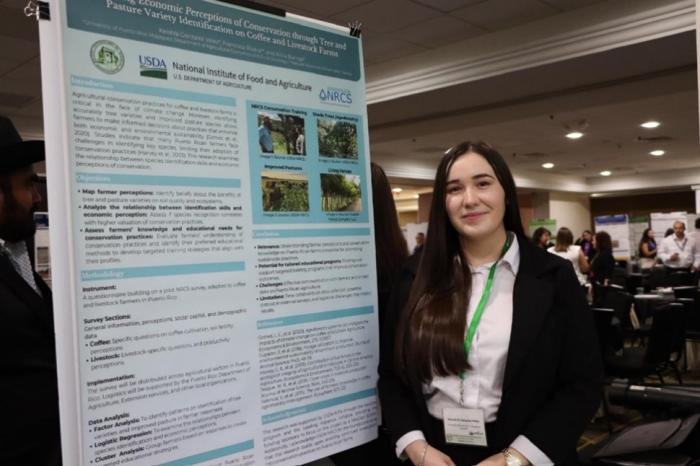Sowing a Future for Land Conservation in Puerto Rico: An Interagency Collaboration Bearing Fruit for Agriculture

A collaborative study on conservation awareness leads to inspired graduate students motivated to better understand famers' perceptions of conservation practices and to propose practical solutions and educational strategies.
Sowing a Future for Land Conservation in Puerto Rico: An Interagency Collaboration Bearing Fruit for Agriculture
Hato Rey, PR, January 8, 2025 – In the fertile fields of Puerto Rico, where the traditions of coffee farming and livestock intertwine with lush landscapes, a group of passionate professionals has sown the seeds of transformative change. It all began with a study proposed by the United States Department of Agriculture (USDA) Natural Resources Conservation Service (NRCS) Agroforestry Systems Specialist Francisco Rivera, in a strong collaboration with the University of Puerto Rico’s Dr. Abner Rodriguez and Dr. Alicia Barriga, and Cooperative Agriculture Extension Service Agent José Ramos. The study, consisting of a 25-question survey, aimed to explore the opinion of farmers and understand their needs and aspirations regarding the conservation of their lands.
The study results were presented at the 47th National Annual Conference of the Puerto Rican Society of Agricultural Science (SOPCA). The objective of the study was to explore whether conservation practices are being adopted on farms and what the perceptions are about their benefits in economic and ecosystemic terms. Sixty farmers participated on the study. Seventy (70) percent of the participants were beef and dairy cattle, and small ruminant producers; the other 30 percent were coffee producers. The farmers came from 35 municipalities distributed in Puerto Rico, mainly located in the center of the island. Three conservation practices were mainly monitored: improved forages (Pasture and Hay Planting Conservation Practice (CP) 512), shade trees (Forest Farming CP 379), and living fences (Silvopasture CP 381 and Fence CP 382). In the surveys, farmers were asked if they carried out these practices. Among the sample, 31% indicated that they use improved forages, 80% have shade trees, and approximately 60% have living fences.
This study concluded:
- Farmers recognize the economic value of conservation practices, seek guidance on the most suitable tree species for their farms.
- Farmers expressed an urgent need to measure shade in their coffee plantations and grazing systems.
- Additionally, they highlighted a significant need to improve their knowledge of forage identification for their animals.
- While the study sample is limited, the described results suggest that the adoption and perception levels are relatively good among the participants; they also indicate which groups should be targeted for education and training efforts.
- It is recommended that more monitoring surveys be carried out on a larger scale, as this will allow detecting effects with greater statistical power and reveal with greater precision where the following steps should be directed.
Opportunities for Developing Research Competencies
Inspired by the results of this survey and their shared passion for agriculture, Keishla M. González Vélez and Daniela Rivera decided to delve deeper into this study. With the support of Francisco Rivera and the guidance of their professor, Dr. Alicia Barriga, both academics are working on projects that aim, not only to gather detailed information about farmers' perceptions, but also to propose practical solutions and educational strategies that directly address their needs.
The project led by Keishla M. González Vélez focuses on analyzing the perceptions of Puerto Rican farmers regarding conservation practices and their relationship to environmental and economic sustainability. Through a detailed questionnaire, this work seeks to gather key information about farmers' levels of knowledge, beliefs, and gaps that lead them to implement or not implement specific practices. Furthermore, it examines the factors influencing their decisions about the management of trees and pastures on their farms, particularly in the context of conservation practices.
The relevance of this project lies in its ability to provide NRCS with strategic data that enables not only better allocation and mobilization of human and financial resources but also the identification of specific knowledge gaps where farmers need support or additional information. These gaps may be addressed through training programs designed to directly meet the needs of Puerto Rican farmers, efficiently promoting conservation practices essential to the environmental and economic sustainability of agriculture on the island.
In October, González Vélez presented her project proposal at the Annual Leading Students Symposium and USDA Career Fair in Mayagüez, Puerto Rico, highlighting how a data-driven approach can transform the relationship between agencies and farmers. This project aims to strengthen the implementation of conservation practices by fostering a more efficient and sustainable management of agricultural resources in Puerto Rico, contributing to both environmental resilience and the economic success of farms.

Image: Keishla M. Gonzalez Velez presenting an abstract of her Master's thesis project proposal at the Annual Leading Students Symposium & USDA Career Fair in Mayagüez, PR.
An Ecosystem of Collaboration
This success would not have been possible without the collaboration of all those involved: Dr. Abner Rodríguez, Dr. Alicia Barriga, and Prof. José Ramos. The farmers, with their knowledge and their desire to improve their practices, were the protagonists of this story. The professors, with their experience and expertise, guided the young researchers and provided the necessary resources. And NRCS Specialist Francisco Rivera, with his vision and dedication, planted the seed that gave rise to this movement.
A Promising Future
The efforts of this team have demonstrated that conservation and agricultural production can go hand in hand. By identifying the specific needs of farmers and providing them with the tools and knowledge they require, a path has been opened toward a more sustainable future for agriculture in Puerto Rico.
#
USDA is an equal opportunity provider, employer and lender.

